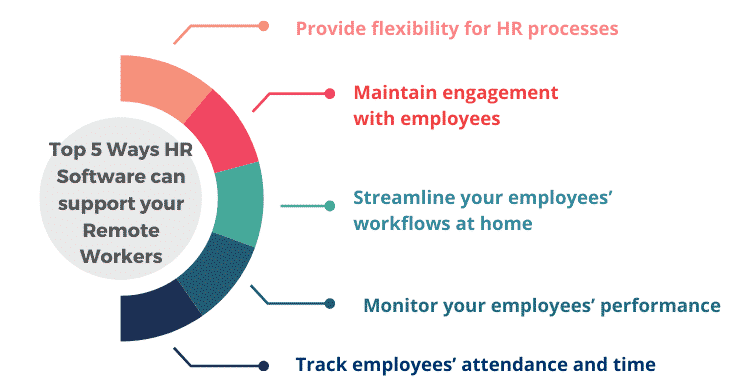1. Flexible HR Processes: Digitizes HR tasks like hiring, onboarding, and payroll, making them accessible remotely.
2. Boosts Employee Engagement: Provides tools for virtual events, team notifications, and gamification to keep remote employees connected.
3. Streamlines Workflows: Offers centralized dashboards and task management tools to help remote employees stay organized and productive.
4. Monitors Performance: Tracks and evaluates employee performance to ensure productivity in a remote setting.
5. Tracks Attendance: Logs work hours and break times, ensuring accountability and accuracy in attendance tracking.
6. Maintains Workplace Culture: Helps translate office culture into virtual environments through digital events and policy communication.
7. Facilitates Employee Feedback: Conducts remote surveys to gather feedback on remote work challenges and improve HR strategies.
While remote work has numerous benefits, it also presents several challenges for employees. Organizations must leverage HR software to ensure employees can work effectively and efficiently from home.
According to a study from Global Workplace Analytics, 25%-30% of the workforce will be working from home by 2021.
Therefore, your company must prepare to meet the growing demand among employees for remote work.
Here are some ways HR software can support your workers as they work from home:
1. Provide flexibility for HR processes
2. Maintain engagement with employees
3. Streamline your employees’ workflows at home
4. Monitor your employees’ performance
5. Track employees’ attendance and time
6. Carry over workplace culture digitally
7. Allow feedback from employees


One of your biggest concerns when transitioning to a work-from-home setup is how to handle HR remotely.
The new setup must accommodate specific processes, such as hiring, onboarding, payroll management, and social events.
Fortunately, HR software can help you transition from doing it traditionally to digitally.
It increases the flexibility of your HR processes, enabling your HR team to perform specific tasks directly from their computer screens.
The software provides them with tools to hire new employees remotely, conduct onboarding orientations, and schedule virtual social events.
Furthermore, HR software can store necessary files and data digitally, making it easier for your employees to access them remotely.
It also enables them to perform tasks outside the office, particularly with cloud-based software.

With your employees working from home, your biggest challenge is keeping remote workers connected.
The difference in location makes it difficult to engage with your employees—there are no longer spontaneous catch-ups in the coffee room and impromptu chats along the hallway.
Using HR software can help you boost employee engagement even with remote setup.
It offers features such as team notification tools to ensure that everyone stays informed.
You can also use it to implement activities that boost engagement, such as integrating gamification into your workflows and holding virtual social events.
HiFives is a global HR digital platform that helps you engage employees remotely.

The change in environment could inevitably affect your employees’ workflow.
They might even be adrift with the freedom and independence that remote work usually brings.
The atmosphere at home could also make them feel alienated from their tasks.
To help get your employees back on track, your HR software can streamline their workflows at home.
Employee communication tools enable managers to distribute tasks and check the progress of their tasks.
Likewise, it provides a communication hub that enables employees to interact with one another and collaborate easily.
You can explore various types of HR software to find one that suits your workflow.
This way, you can ensure your employees’ productivity and efficiency while working from home.


Most businesses are hesitant about remote work because of performance concerns.
Many feel it can decrease employee productivity and efficiency due to the myriad of distractions at home.
However, a study from Global Workplace Analytics shows the opposite. Seventy-three percent of employees report being successful even when working remotely, and most feel more productive at home.
To ensure your employees’ productivity, take advantage of the various tools your HR software offers. For one, it can monitor and evaluate employee performance.
You can issue questionnaires for leaders and managers to rate their outputs, recognize top performers, and reward them accordingly.
With HR software, you can rest assured that your employees can maintain the same professional mindset at home.

Aside from performance, your HR software can also ensure your employees log in at the correct hours for work.
It can track their attendance and work time and notify you of any discrepancies. Furthermore, it can also have the option to log break times in between.
This function ensures that your employees adhere to their agreed-upon work hours.
They will have to log in when they start work and log out as soon as they finish.
It makes it easier for your HR to monitor delinquent employees or those who go AWOL.
It could also help you adjust payroll accurately and fairly.
For example, you could compensate for overtime and manage their leave accordingly.
It also instills a sense of accountability and discipline in your employees as they work remotely.

Utilizing HR software can solidify your HR role in a remote work environment.
It helps you make sure HR managers can continue overseeing your workers wherever they might be.
Likewise, they can carry over your workplace culture into the virtual space.
Your HR software can provide the infrastructure you need to establish your workplace culture in the digital space.
It allows your HR to set up a calendar of events and activities you used to do in your office, which you can then view with the rest of your remote workers.
It can even send automatic notifications or reminders for such events.
Likewise, it can facilitate more streamlined communication and the implementation of workplace policies and expectations.
Your business processes aren’t the only ones that must adapt to the changing times.
Culture also plays a critical role in enhancing your business’s success.

Another benefit of having HR software is its ability to create and conduct surveys among your employees that they can complete remotely.
Through this, you can gauge their satisfaction with the setup, the challenges they face, and its impact on their performance.
This feedback can provide you with crucial data to create more effective strategies for remote work.
It can help identify the strengths and weaknesses of your current guidelines and policies, informing their improvement later.

Remote work is becoming a standard setup among businesses.
With the current technologies, employees can work from home as efficiently and effectively as when they are working in the office.
You only need the right tools and software to support them in their homes.

It means digitizing HR essentials—like hiring, onboarding, payroll, and social events—so they can all be handled online, anytime, anywhere. Employees and HR teams gain easy access through cloud-based systems.
By enabling virtual events, streamlined notifications, and gamified interactions, HR software keeps remote workers connected, recognized, and motivated.
It offers centralized dashboards and communication hubs that help remote employees manage tasks, collaborate seamlessly, and stay productive.
It provides tools such as performance-tracking dashboards, manager evaluations, and recognition workflows to ensure remote productivity stays on track.
Yes—HR software can capture work hours, breaks, log-ins, and log-outs. This builds accountability, ensures accurate payroll, and supports fair time tracking.
By enabling digital calendars of social events, policy updates, and reminders, HR software keeps cultural touchpoints visible and accessible in a virtual environment.
With built-in tools for conducting surveys and collecting feedback, HR software helps leaders gather insights into remote work challenges and sentiment to inform smarter strategy adjustments.
HR Software can support your Remote Workers in many ways.
By digitizing certain workflows and processes, it can help manage your employees no matter where they are. It has tools and functions to streamline communication between employees, monitor their performance and attendance, boost their engagement, and build a strong work culture virtually.

Lead author: Sagar Chaudhuri, the Co-Founder and CEO of HiFives. He is an HR Tech Evangelist with over 25 years of experience in both corporate and entrepreneurial settings. Previously, Sagar has held leadership roles with companies such as Genpact, Infosys, and ICICI Bank. He has an engineering degree from IIT Kharagpur and an MBA from IIM Lucknow. Connect on LinkedIn
To stay updated on the latest HiFives blogs, follow us on Twitter (@MyHiFives)